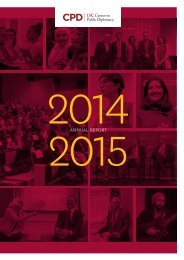You also want an ePaper? Increase the reach of your titles
YUMPU automatically turns print PDFs into web optimized ePapers that Google loves.
PUBLIC DIPLOMACY IN SUB-SAHARAN <strong>AFRICA</strong><br />
have impacted their political activities and<br />
their countries’ democratic transitions.<br />
Early in their careers, both Kufuor and<br />
De Klerk participated in the International<br />
Visitor Leadership Program (IVLP), the U.S.<br />
State Department’s premier international<br />
exchange program. Designed for midcareer<br />
professionals who exhibit leadership<br />
qualities, participants of the IVLP visit<br />
Washington, D.C. for a primer on democracy<br />
and American history, then meet with their<br />
counterparts in other American cities of<br />
their choosing. Mbeki also studied abroad—<br />
in Moscow, London, and Manchester—<br />
before becoming president of South Africa.<br />
In fact, four of the thirteen political leaders<br />
interviewed for this book participated in<br />
IVLP, another was a Fulbright scholar, and<br />
nine total studied abroad in Europe and the<br />
United States before becoming a driving<br />
political force at home. With such a strong<br />
connection between many of these leaders<br />
and the United States, another layer of<br />
U.S. public diplomacy’s influence emerges.<br />
By overlooking this factor, the authors<br />
miss the opportunity to draw a connection<br />
between U.S. public diplomacy efforts and<br />
the decision of each nation to transition to<br />
democracy.<br />
Although the editors do not use public<br />
diplomacy terms to describe the forces<br />
driving democratization in Ghana or South<br />
Africa, public diplomacy tools played a significant<br />
role in laying the foundations for<br />
democracy and inspiring these political<br />
transitions. Likewise, although the editors<br />
do not characterize these movements in<br />
such terms, their conclusions demonstrate<br />
the continued need for public diplomacy efforts<br />
to ensure smooth and full transitions<br />
to democracy. The editors also argue that<br />
all democracies are unfinished projects and<br />
that leadership plays an important role in<br />
shaping their futures. De Klerk claims that<br />
he does not want to “present [him]self as a<br />
hero,” but this collection of interviews does<br />
precisely that for each of its subjects. 7 This<br />
87<br />
WINTER 2016 | @PD_Mag<br />
book in itself is an instrument of public diplomacy,<br />
adding depth to our understanding<br />
of each featured country and its leaders,<br />
and attempting to shape our perception of<br />
their national narratives.<br />
FOOTNOTE:<br />
1 Democratic Transitions: Conversations with<br />
World Leaders. Eds. Sergio Bitar and Abraham F.<br />
Lowenthal. Baltimore: Johns Hopkins University<br />
Press. 2015.<br />
2 Democratic Transitions.<br />
3 Democratic Transitions.<br />
4 Democratic Transitions.<br />
5 Democratic Transitions.<br />
6 Democratic Transitions.<br />
7 Democratic Transitions.<br />
Amanda Lester<br />
Masters Of<br />
Public Diplomacy<br />
Amanda Lester is a first-year graduate<br />
student of Public Diplomacy at USC.<br />
Prior to this, she worked in market research<br />
at a start-up company in Austin,<br />
Texas. She holds a B.A. in Plan II Honors<br />
(liberal arts and sciences) and a B.M. in<br />
Music Performance from the University<br />
of Texas at Austin. Currently she is<br />
a Contributing Researcher at the USC<br />
Center on Public Diplomacy.<br />
AN INTRODUCTION TO CRISIS DIPLOMACY &<br />
ENDNOTE<br />
JUSTIFYING<br />
PAUL KAGAME<br />
GENOCIDE, TRAUMA, HISTORICAL<br />
MEMORY & PUBLIC DIPLOMACY<br />
Douglas Becker<br />
CULTURE PUBLIC-PRIVATE GOVERNMENT<br />
WINTER 2016 | @PD_Mag<br />
88



